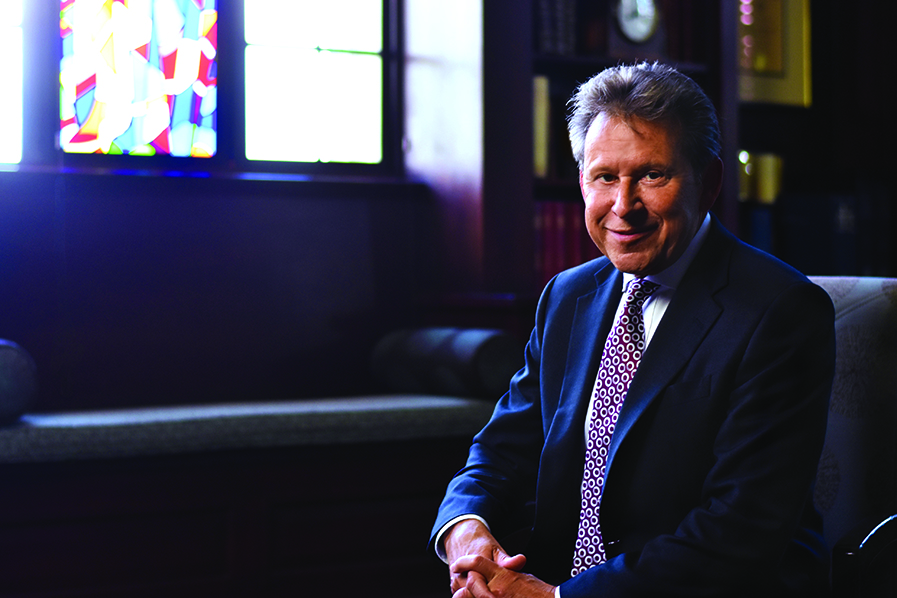University of Redlands Emergency Alert System
Alert Received: . For more information, visit: https://www.redlands.edu/alert/
University of Redlands
- Home
- Och Tamale
- Summer 2019
- Thoughts from the President's Office

0n July 1, the University of Redlands and San Francisco Theological Seminary (SFTS) merged, creating the new U of R Graduate School of Theology and providing a campus in the Bay Area to host programs from both organizations.
Building on our common purpose to “educate both heart and mind,” the partnership leverages strengths of both institutions to create something neither could have offered alone. Thus, the theme of the new relationship, as SFTS becomes an essential part of the U of R, is “1 + 1 = 3.”
In this issue of Och Tamale magazine, you’ll read more about how this transformational partnership emerged and the excitement around the new programs being launched. Thanks to the merger, Redlands will extend teaching and counseling programs in the School of Education, leadership programs in the School of Business, and experiential-learning and humanities opportunities,
such as May Term and First-Year Journeys, in the College of Arts and Sciences. The Marin campus also provides a new location for these schools’ academic and creative events, alumni gatherings, and recruitment. For SFTS, the merger preserves and enhances its mission to train people for ministry, defined broadly as leadership and service to the world.
While the feedback on this historic development has been overwhelmingly positive, we have received questions, as expected, pertaining to religious affiliation: “Is Redlands becoming Presbyterian?” “Will SFTS become secular?”
The answer is that little will change in this regard: The University of Redlands as a whole will remain secular, while SFTS will maintain its identity informed by its Presbyterian tradition within a new, multifaith graduate school. For examples of seminaries embedded in secular universities, one has to look no further than Harvard, Princeton, Emory, Yale, or the University of Chicago, where I walked by its McCormick Theological Seminary every day on the way to medical school.
In a white paper, SFTS faculty members Wendy Farley and Christopher Ocker call the seminary-within-a-university structure “not only mutually beneficial, but an important component of a socially engaged, globally oriented multicultural university.” They continue: “A physics curriculum operates in a different way from a curriculum in, for example, business management, environmental public policy, educational leadership, African diaspora, or queer theory—and yet they share commitments to evidence, truthfulness, and accountability. A theology school, at least the kind of theology school that SFTS is, embraces these norms unequivocally.”
Over the past months, I have learned much about the discipline of theology and what it can contribute to dialog in the humanities. Similar to a school of medicine—whose subjects include not only the practice of medicine, but also the fundamentals of molecular biology, chemistry, anatomy, physiology, pharmacology, and psychology—a seminary is far more than a trade school for ministers. Scholars of theology offer knowledge not only of the world’s religions, but also of philosophy, ethics, history, literature, rhetoric, writing, psychology, sociology, and public policy.
As president, I believe my most important job is to think about how to best position the University for the future. In 10 years, I believe we will look back and celebrate the new colleagues, programs, and possibilities the Redlands-SFTS union made possible. The full range of opportunities is still being explored; intriguing new ideas continue to bubble up—such as a recent proposal to launch a program in liturgical music, leveraging expertise within SFTS and the School of Music.
We already have concrete plans to introduce at least five additional degree programs and three certificates that are either brand new or new to the region. These include the online Certificate in Mental Health and Spirituality, which is already available, and an M.S. in Organizational Leadership and M.A. of Education: Teaching and Learning, which will both debut on the Marin campus in January 2020. Please spread the word to friends and family who might be interested.
If you haven’t already had an opportunity to visit the Marin campus, with its historic buildings and sylvan hills, please come to one of our events. Experience for yourself the incredible feeling of being away and yet at home; many say it’s how they felt the first time they set foot on the Redlands campus.
I extend a warm welcome to all of our new colleagues, students, and friends. And thank you to everyone who has contributed their ideas, enthusiasm, support, and hard work to help make this exciting new venture a reality.
I look forward to the future we will build together.
Forever yours,
Ralph W. Kuncl, PhD MD
President
University of Redlands